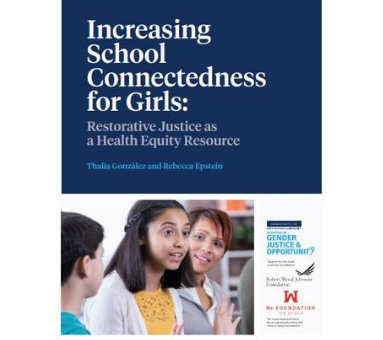

February 2020
This brief illustrates the need for school-based restorative justice (RJ) policies and procedures for marginalized girls to achieve higher educational attainment and lifelong health benefits and success.
The brief focuses on three key points:
- 1. Education is a key social determinant of health
- 2. Feeling connected to school is crucial to health and school success
- 3. RJ can help marginalized girls feel connected to school
DOWNLOAD ISSUE BRIEF or read more below.
Brief Introduction
Schools can play an essential role in ending health inequities. But not all students experience schools in the same ways. Given the intersectional factors of race, gender, sexual identity, and poverty in their lives, marginalized girls are at a particularly high risk of negative outcomes in schools, including punitive and exclusionary discipline, school pushout, and contact with law enforcement and the juvenile justice system. They also face high rates of trauma, which further elevates their chance of decreased school engagement even in the absence of other factors. Taken cumulatively, the experience of marginalized girls makes them uniquely vulnerable to lower levels of educational attainment, leading to lifelong negative health effects.
School connectedness, defined as students’ belief that adults in their school care about their learning and about them as individuals, results in lower rates of health-risk behaviors and improved academic performance. Over the last ten years, evidence has increasingly shown that in addition to reducing discipline disparities, RJ has also been shown to promote positive student and teacher relationships and peer-to-peer relationships, healthier school climates, increased feelings of self-efficacy, improved academic performance, and social and emotional skill development. Each of these outcomes fosters school connectedness, which ultimately advances health equity for students.


The potential health benefits of school connectedness — especially as a mitigating factor for health inequities for marginalized girls— demands heightened attention from educators and policymakers. For too long, girls have been largely left out of the mainstream education reform conversations. This issue brief examines the use of RJ in K-12 schools across the country as a multi-tiered system that supports increased school connectedness for marginalized girls.
To consider the potential for RJ to positively support girls’ school connection and attainment, this issue brief reviews key research in the following primary areas:
- - Education as a critical social determinant of health
- - Exclusionary discipline as a factor for school disconnection and entry into the school-to-prison pipeline
- - Effects of trauma on educational outcomes
- - Gender differences in trauma and adverse childhood experiences (ACEs)
- - Empirical evidence of school-based RJ
It then maps outcomes of RJ in the context of school connectedness, as well as other protective factors that support childhood health and well being. It concludes with recommendations for future action in policy, practice, and research, drawing attention to the pressing need to more fully integrate trauma-informed and gender-responsive best practices into school-based RJ.


